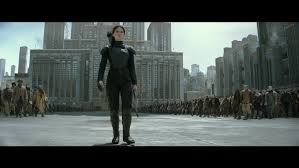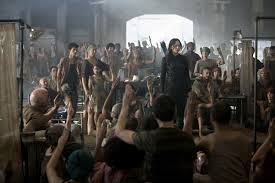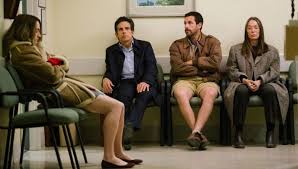NO MORE FUN AND HUNGER GAMES: The Hunger Games: Mockingjay – Part 2
Posted: December 7, 2015 | Author: Donald | Filed under: Uncategorized | Tags: Danny Strong, Donald Sutherland, Francis Lawrence, Jennifer Lawrence, Julianne Moore, Mockingjay, Peter Craig, Philip Seymour Hoffman, Suzanne Collins, The Hunger Games | 2 Comments »First, a word from our sponsors: I am now offering a new service: so much emphasis has been given lately to the importance of the opening of your screenplay, I now offer coverage for the first twenty pages at the cost of $20.00. For those who don’t want to have full coverage on their screenplay at this time, but want to know how well their script is working with the opening pages, this is perfect for you. I’ll help you not lose the reader on page one.
Ever wonder what a reader for a contest or agency thinks when he reads your screenplay? Check out my new e-book published on Amazon: Rantings and Ravings of a Screenplay Reader, including my series of essays, What I Learned Reading for Contests This Year, and my film reviews of 2013. Only $2.99. http://ow.ly/xN31r
and check out my Script Consultation Services: http://ow.ly/HPxKE
Warning: SPOILERS
 At the end of The Hunger Games: Mockingjay – Part 1, I was left with one burning question: was Alma Coin, leader of the revolution, trying to bring freedom to the land, or was she only seeking power?
At the end of The Hunger Games: Mockingjay – Part 1, I was left with one burning question: was Alma Coin, leader of the revolution, trying to bring freedom to the land, or was she only seeking power?
Well, I have now seen The Hunger Games: Mockingjay – Part 2 and I have my answer.
And no, I’m not going to tell you because it leads to one of the most satisfying climactic scenes in movies for a while.
Of course, I should start off by saying that there is no way I will admit that The Hunger Games is great filmmaking. It certainly has a myriad of faults.
At the same time, I have found this franchise to be more intellectually intriguing, even fascinating, than others like it. There has always been something about the stories that stayed with me, something buried (a bit too much, I believe, at times) at the core of it. For me, The Hunger Games has always been a complex study of how a revolution begins, builds and bursts forth upon the land combined with the crowd pleasing wrappings of a commercial aesthetic.
It’s certainly no Lord of the Rings or Game of Thrones. Yet, I find it more rewarding than Harry Potter if for no other reason than half the time I never quite new where the story was going when it came to Hogwarts and environs (especially in the last entry which, in spite of being split into two films, I’m not convinced it ultimately made a lot of sense). Read the rest of this entry »
NO MORE FUN AND HUNGER GAMES or THE REVOLUTION WILL BE TELEVISED: Movie review of The Hunger Games: Mockingjay-Part I by Howard Casner
Posted: November 28, 2014 | Author: Donald | Filed under: Uncategorized | Tags: Danny Strong, Donald Sutherland, Elizabeth Banks, Francis Lawrence, Jeffrey Wright, Jennifer Lawrence, Josh Hutcherson, Julianne Moore, Liam Helmsworth, Peter Craig, Philip Seymour Hoffman, Stanley Tucci, Suzanne Collins, The Hunger Games: Mockingjay-Part I, Woody Harrelson | 8 Comments »First, a word from our sponsors. Ever wonder what a reader for a contest or agency thinks when he reads your screenplay? Check out my new e-book published on Amazon: Rantings and Ravings of a Screenplay Reader, including my series of essays, What I Learned Reading for Contests This Year, and my film reviews of 2013. Only $2.99. http://ow.ly/xN31r
Warning: SPOILERS
 Okay.
Okay.
How to start.
Well, there’s really no point in putting it off.
At the risk of losing what little reputation I have (if I even have one); at the risk of inviting ridicule, derision, mockery and scorn from those who read my reviews who don’t already hold me in ridicule, derision, mockery and scorn; and at the risk of being reviled by serious filmgoers far and wide…
The Hunger Games: Mockingjay-Part I is not nearly as bad as the critics claim it is and is by far the best entry in the franchise to date, far better than the first two films. Read the rest of this entry »
Movie Review of LEE DANIELS’ THE BUTLER by Howard Casner
Posted: August 27, 2013 | Author: Donald | Filed under: Uncategorized | Tags: Adriane Lenox, Cuba Gooding, Danny Strong, Forest Whitaker, Jr., Lee Daniels, Lenny Kravitz, Oprah Winfrey, Terence Howard, The Butler | 1,434 Comments »I think it’s safe to say that Lee Daniels’ The Butler is no Django Unchained when it comes to race relations. No, this chronicle of the life of a black butler who served at the White House over eight administrations is a bit too well intentioned for that. At the same time, it’s one of those well intentioned movies that probably would have benefited from being a little less well intentioned.
…The Butler is what is usually called middle brow—in other words, it’s a film that deals with serious and challenging subject matter, but does it in a way that will never seriously challenge anyone (while making them think it does). It’s a movie that takes no real chances, has no real edge, does nothing new, because in the end, the choices the producers, the director (Lee Daniels, hence the title) and writer Danny Strong make, feel as if they were made with a firm eye on the box office. This doesn’t mean that the movie isn’t entertaining. It’s definitely that (though somewhere towards the end, one does start to feel its length). But in the end, it’s little more than that.
For those of you who have been on a walking tour of Siberia for the last few months, Lee Daniels’ The Butler revolves around Cecil Gaines, a black man who rose from cotton picker’s son to being a domestic at 1600 Pennsylvania Avenue. The story is basically ironic. It’s about a man who is fixed squarely in the midst of history (he can’t seem to turn around without it smacking him in the face), yet at the same time, takes absolutely no part in it. He watches it go by, like a parade, but never actually marches with it.
The strongest scenes in the film are the scenes of everyday life of Gaines’ family and friends, the times they gather to gossip, play cards, drink. There is an incredible naturalness to these scenes, an improvisational verisimilitude that is often riveting. At times it feels as if one could watch these scenes of domesticity flow on forever. All of which leads to a second bit of irony: the less political the movie is, the more alive and vibrant it is. Whenever the focus is on the issues, the more on the nose and obvious it becomes until it takes on the weighty tone of one of those message pictures from the old days of MGM and Twentieth Century Fox.
By using what is called poetic license, screenwriter Strong is able to dramatize every single important civil rights issue and event from the 1950’s on. He does this by giving Gaines a “the times, they are a changing” son (in real life, the character Gaines is based on had no such troubled relationship with his offspring). Whatever event Gaines doesn’t witness himself, his son can experience them by going on the road with the freedom riders, being a personal friend of Martin Luther King or joining The Black Panthers. If this method of story telling comes across as convenient, well, it is. And while the scenes at Gaines’ home feel fresh and felt first hand, the rest of the movie comes across more like a Cliff Notes (remember those) version of race relations in America.
This is seconded by the casting of such stars as Robin Williams, Vanessa Redgrave, James Marsden and John Cusack in the white roles. Much has been made of this stunt casting. But it should also be noted that this is stunt casting in which none of the cast is given any stunts to do. Almost no one really resembles, and at times barely sounds like, their real life counterparts (the make up feels especially uninspired). Only Jane Fonda really escapes unscathed in her role as Nancy Regan (a further irony: the former anti-war activist playing the people, here and in The Newsroom, that she use to rail against when she was younger).
But if the movie is saved, it is saved by the dynamic performances of the rest of the cast. Forest Whitaker is perfectly fine as Gaines, but it’s Terence Howard, Adriane Lenox, Cuba Gooding, Jr. and Lenny Kravitz who shine as Gaines’ fellow workers and neighbors.
However, towering over everyone is Ms. Oprah Winfrey who takes no prisoners with her performance as Gaines’s wife. Before her appearance, the movie is little more than sincere, a bit stiff and familiar. But from her first appearance, slightly slattern, obviously tipsy, a cigarette dangling precariously from her mouth, she brings an energy and intensity to the screen that was missing earlier. It’s a deeply moving performance.
Two more issues to be noted. First, in the social media and criticism world that surrounds this movie, there is a suggestion that this is an original and ground breaking story, something that’s never been told before. But are people really this young? In many ways, one could make the argument that this is little more than a sequel to a popular TV mini-series from 1979 called Backstairs at the White House which dramatized the lives of people like Gaines from the time of Taft to Eisenhower (with Andrew Duggan in the Robin Williams role).
Second, I remember when there was a lot of criticism of the movie The Help, a movie about southern domestics, criticism that often came out before the movie was even released. I’m not sure why there was so much anger toward that film, but not toward this one. Gaines is far more passive than any of the characters in The Help, all of whom were far more willing to risk their lives and positions than Gaines would ever think to do (the most he does is demand equal pay for blacks as for whites, but he demands it at such a late date and so near his retirement, it seems a hollow victory and has none of the emotional resonance that the decisions made by the characters in The Help did). And if you’re one of the ones who thought the maids in the earlier film were stereotypes, then logically you should consider Gaines to be something out of a 1930’s movie. For those of you who trumpeted Lee Daniel’s The Butler, but criticized The Help, you not only should have your head examined, you need to apologize to Viola Davis and Octavia Spencer.










 For questions: hcasner@aol.com
For questions: hcasner@aol.com The Meyerwitz Stories (Both Old and New) opened both on the Netflix streaming platform and in the theaters at the same time. The goal, as I surmise it, it to have a qualifying run for the Oscar race (and screeners have been sent) while giving it as little theatrical distribution as possible.
The Meyerwitz Stories (Both Old and New) opened both on the Netflix streaming platform and in the theaters at the same time. The goal, as I surmise it, it to have a qualifying run for the Oscar race (and screeners have been sent) while giving it as little theatrical distribution as possible.
